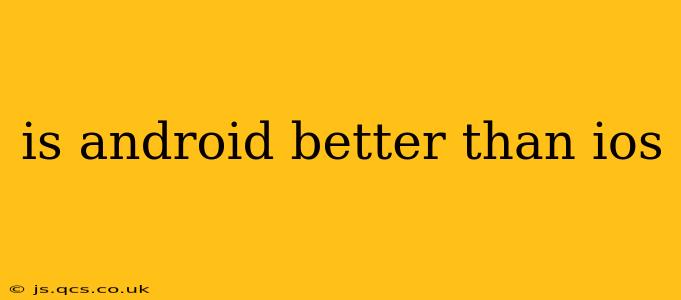The age-old question: Android vs. iOS. Which operating system reigns supreme? The truth is, there's no single "better" option. The ideal choice hinges entirely on individual preferences, needs, and priorities. This in-depth comparison will explore the key differences, helping you decide which platform aligns best with your lifestyle.
What are the Key Differences Between Android and iOS?
At their core, both Android and iOS serve the same purpose: to power smartphones and tablets. However, their approaches to user experience, app ecosystems, and customization differ significantly. Android, developed by Google, emphasizes openness and flexibility, while iOS, Apple's creation, prioritizes simplicity and a tightly controlled environment.
Android: Open-source, boasts a vast array of devices from various manufacturers, offering diverse price points and features. Customization is a major selling point, allowing users to personalize nearly every aspect of their phones.
iOS: Known for its user-friendly interface, seamless integration within the Apple ecosystem, and a strong focus on privacy and security. Its app store boasts a curated selection of high-quality applications, often with a premium feel.
What are the pros and cons of Android and iOS?
Let's break down the advantages and disadvantages of each platform:
Android Pros:
- Customization: Unmatched flexibility in customizing the look, feel, and functionality of your device.
- Open Source: Allows for greater freedom and control over the operating system.
- Variety: Wide range of devices at various price points, from budget-friendly options to high-end flagships.
- Widget support: Extensive widget options allow for greater personalization of the home screen.
Android Cons:
- Fragmentation: The large number of devices and manufacturers can lead to inconsistencies in software updates and features.
- Security: While improving, Android's open nature can sometimes make it more vulnerable to malware.
- Bloatware: Some pre-installed apps on certain devices can be unnecessary or unwanted.
iOS Pros:
- User-friendliness: Intuitive interface easy to navigate even for first-time smartphone users.
- Seamless Ecosystem: Works flawlessly with other Apple devices like Macs, iPads, and Apple Watches.
- Security & Privacy: Strong focus on user privacy and data protection.
- App Store Quality: Rigorous app review process ensures a curated selection of high-quality apps.
iOS Cons:
- Limited Customization: Fewer options for personalizing the device compared to Android.
- Higher Prices: Generally more expensive than comparable Android devices.
- Less Flexibility: Stricter control over the operating system limits user freedom and control.
Which Operating System is Better for Gaming?
Both Android and iOS offer extensive game libraries. However, the "better" platform depends on individual preferences. Android often boasts a wider selection of games and more affordable devices capable of handling demanding titles. iOS, on the other hand, often features higher-quality graphics and smoother performance due to tighter hardware-software integration and consistent optimization across devices.
Is Android or iOS More Secure?
Both platforms prioritize security, employing various measures to protect user data. iOS, with its tightly controlled environment, often receives praise for its robust security features and quicker response to security threats. Android, while historically having more security vulnerabilities, has made significant strides in recent years with advancements in its security protocols and Google Play Protect. Ultimately, the level of security depends on user practices, like keeping software updated and avoiding suspicious downloads.
Which OS is Easier to Use?
iOS generally receives higher marks for user-friendliness, owing to its intuitive interface and simplified design. Android's customization options, while beneficial for power users, can be overwhelming for those new to smartphones. However, Android interfaces have also become increasingly user-friendly in recent years, offering simpler options for beginners.
Which Phone is Best for Seniors?
The "best" phone for a senior depends on their tech proficiency and specific needs. Both platforms offer accessible features like large fonts and voice control. However, iOS's simpler interface might be preferable for those less comfortable with technology. Ease of use is often a more critical factor than the operating system itself. Consider devices with large screens, simple menus, and helpful accessibility features regardless of the platform.
In conclusion, the "better" operating system is subjective. Consider your priorities – customization, cost, user-friendliness, ecosystem integration, security, and gaming capabilities – to determine which platform best suits your individual needs. Both Android and iOS offer robust features and cater to diverse user preferences.
